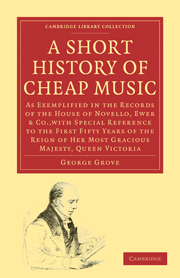 A Short History of Cheap Music
A Short History of Cheap Music Summary
“Hath lie provided this music?”
Much ado about nothing. Act i., Sc. 2.DURING the course of the year 1857, an experiment had been quietly tried with a result that was in every way satisfactory. The desire of the publisher was realised, and the prospect of further extending the love for art in one of its most valuable forms opened out brightly. This was to provide by degrees a series of compositions, by the best living writers, for the use of the service of the Church of England. The first work was an anthem, “O praise the Lord,” written by John Goss, organist of St. Paul's Cathedral, in December, 1856, for the enthronement of the Bishop of London (the Right Rev. Dr. Jackson). It was intended to be sung in procession, and was available with or without accompaniment. The demand for this simple and effective composition was very great, and the composer was asked to write other anthems of like kind. This he agreed to do, and provided for the March number of The Musical Times, in time to be of use at Easter, one entitled “Christ our Passover,” and another, “Behold I bring you good tidings,” for Christmas. In response to the invitation of the practical head of the firm, Goss wrote many pieces well calculated to add dignity to the service of the Church.
- Type
- Chapter
- Information
- A Short History of Cheap MusicAs Exemplified in the Records of the House of Novello, Ewer and Co., with Special Reference to the First Fifty Years of the Reign of Her Most Gracious Majesty, Queen Victoria, pp. 73 - 100Publisher: Cambridge University PressPrint publication year: 2009First published in: 1887


